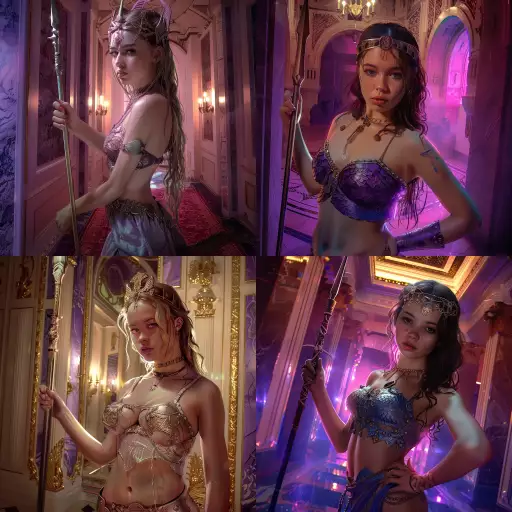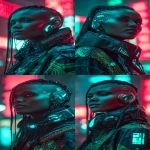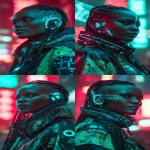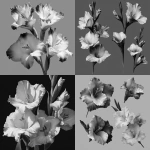Explore the Best AI Image Gallery

The Algorithmic Muse: Exploring the Ethics of AI-Generated Media
The world of art and media is undergoing a seismic shift, driven by the rapid advancements in artificial intelligence (AI). AI algorithms are now capable of generating stunningly realistic images, composing captivating music, and even crafting compelling narratives. This burgeoning field of AI-generated media presents both exciting opportunities and profound ethical challenges that demand careful consideration.
A New Creative Frontier
AI-powered tools are democratizing creativity, making it accessible to individuals who may not have traditional artistic training or resources. Imagine an aspiring musician using AI to compose a symphony or a writer leveraging AI to overcome writers block and generate innovative story ideas. These tools can empower individuals to explore their creative potential in unprecedented ways.
Moreover, AI can augment the work of established artists and creators. Imagine a painter collaborating with an AI to explore new color palettes or a filmmaker using AI to generate realistic special effects. By seamlessly integrating human creativity with AIs computational power, we can unlock entirely new realms of artistic expression.
The Ethical Tightrope
While the potential benefits of AI-generated media are undeniable, it is crucial to acknowledge the ethical complexities that accompany this technology.
Copyright and Ownership:
A fundamental question arises: who owns the copyright to AI-generated content? Is it the developer of the AI algorithm, the individual who provides the input prompts, or the AI itself? Establishing clear legal frameworks is essential to protect the rights of creators and ensure fair compensation for their work.
Bias and Representation:
AI algorithms are trained on massive datasets, which can inadvertently perpetuate existing societal biases. This means that AI-generated content may reflect and amplify harmful stereotypes or lack diversity in representation. It is imperative to develop methods for identifying and mitigating bias in AI training data to ensure that AI-generated media promotes inclusivity and fairness.
Misinformation and Manipulation:
The ability of AI to generate highly realistic content raises concerns about the potential for misuse. Malicious actors could use AI to create convincing fake news, deepfakes, or propaganda, undermining trust in information sources and eroding social cohesion. It is crucial to develop safeguards against the malicious applications of AI-generated media and promote media literacy among the public.
Shaping the Future: Responsible Innovation
The ethical considerations surrounding AI-generated media are complex and multifaceted. Addressing these challenges requires a collaborative effort involving policymakers, industry leaders, researchers, and the general public.
- **Transparency and Accountability:** Develop clear guidelines for the development and deployment of AI-powered creative tools, ensuring transparency in their algorithms and decision-making processes.
- **Education and Awareness:** Promote media literacy initiatives to empower individuals to critically evaluate AI-generated content and identify potential biases or manipulations.
- **Ethical Frameworks and Regulations:** Establish robust ethical frameworks and regulations that govern the use of AI in creative industries, addressing issues of copyright, ownership, and responsible innovation.
AI-generated media has the potential to revolutionize the creative landscape, but it is essential to navigate this new frontier responsibly. By embracing ethical considerations and fostering open dialogue, we can harness the power of AI to unlock new creative possibilities while safeguarding the integrity of art, expression, and human connection.












](https://images.ai-img.art/thumbnails/150/08baaaca8d12502f281846feba6b0cf89edf106843ff56346812f5eec39eeed1.webp)
](https://images.ai-img.art/thumbnails/150/916a8f2aa9c13d051af4ab588a4921732f41e144150bdfc78853a28500cd717d.webp)






](https://images.ai-img.art/thumbnails/150/6b15b97ffd39aeb1b066fd2c8b33c1a2dd03a3966282ec6508e2c2c205c0360f.webp)






](https://images.ai-img.art/thumbnails/150/0791636c23fa42b3fd87dbe2541b7d3047cdb4d5fc0dab19f4efcfe1439963da.webp)



](https://images.ai-img.art/thumbnails/150/477a6a01318cd965f7f5f6ecc623f70e7e61f0004811369ce0977db761aecd57.webp)




](https://images.ai-img.art/thumbnails/150/ffdc3aeb085cdd89cb67916c26208f25e7c7b0250ad6e5877b48414760697a90.webp)












